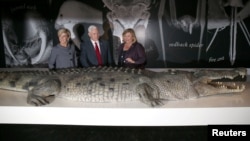The crocodile industry in Australia's Northern Territory, a new report says, is worth more than four times the previous estimate of US $80 million. Officials hope the findings will give poorer aboriginal communities the chance to develop crocodile farming industries.
The saltwater creature is the world's largest reptile. In Australia, they were once hunted to the brink of extinction, mainly for their skins, which were used to make durable leather goods and clothes.
They have been a protected species since the early 1970s, and their numbers in Australia's tropical north have soared.
Economic opportunities
The Northern Territory regional government now sees economic opportunities for indigenous communities, where officials want to see an expansion of crocodile egg collection programs.
The eggs would help to stock crocodile farms owned by aboriginal groups, or traditional owners of land, which would supply reptile skins to big fashion houses including Louis Vuitton and Gucci, as well as supplying crocodile meat.
"We are looking at direct investments into rangers to make sure that we see on country a growth in the crocodile industry, so the harvesting of eggs, the growing of the crocodile locally and remotely, which is a very important and valuable use of traditional country done by traditional owners," said Michael Gunner, the Northern Territory's chief minister.
Hunting for sport?
An independent Australian MP, Bob Katter, has said that as crocodile numbers increase, so does the threat to people. He believes big game trophy hunters should be allowed to shoot them for sport. Katter has argued that crocodile safaris would boost the incomes of indigenous communities.
While the Northern Territory government supports crocodile safaris, the final decision rests with Australia's federal government, which has refused to allow them. Conservationists have insisted that the shooting of iconic animals for profit in Australia is abhorrent and should never be allowed.




